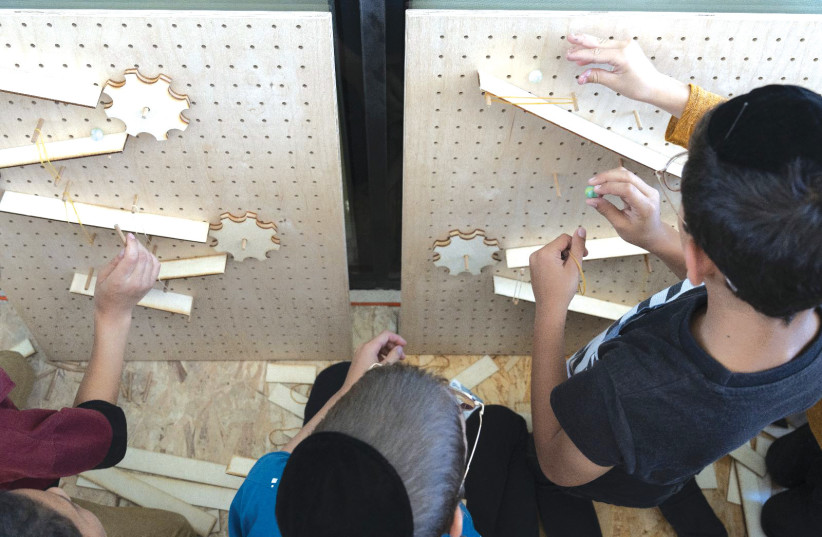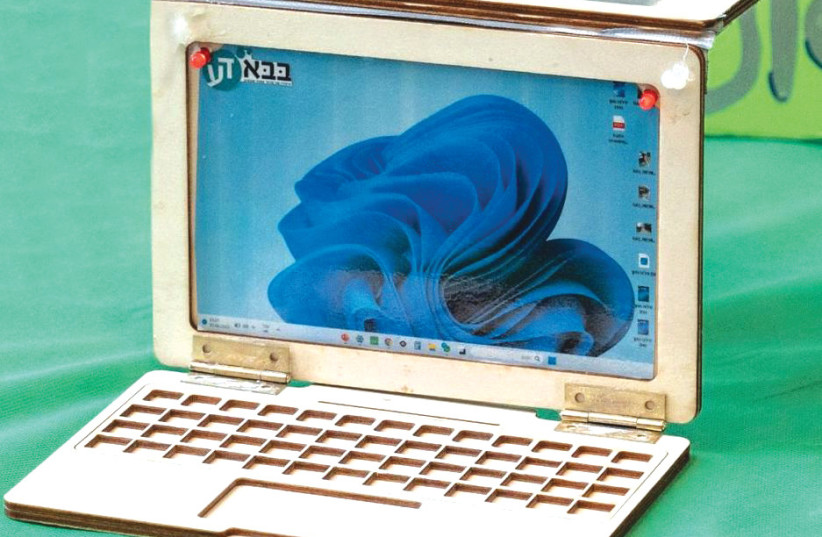Matti, a 13-year-old haredi youth from Beit Shemesh, never thought he’d build his own robot. But thanks to the efforts of an organization founded to educate haredi youth in science, technology, engineering, and math (STEM) that’s backed by some of Israel’s top hi-tech mavens, he, along with 400 other boys, were knee-deep in chips and vectors this week.
Babada, a nonprofit, is seeking to solve a serious issue that has dodged Israeli society for years – the lack of secular education that has kept haredim mostly out of the hi-tech sector.
Making up 13% of Israel’s population, haredim hold down only 4% of hi-tech jobs. This is due in part to the primary focus on Torah studies in haredi schools, and to the lack of STEM programming and curriculum in the schools.
There are today a number of organizations working to assist in skill building, chief among them Machon Lev, MeGo, and the Joint – and even some of Jerusalem’s fastest growing start-ups are haredi led. Many members in the ultra-Orthodox community have developed deep critical thinking skills through their yeshiva studies, and as such have been interested in learning and developing additional skills to broaden their horizons.
Babada, which has been operating somewhat under the radar for some time now, is making the greatest impact on a population within the haredi world that was otherwise seen as untouchable, and that in many ways presents the best opportunity to work toward bridging the gap.
 STUDENTS GOT hands on during the day-long event. (credit: ADAM RABINOWITZ)
STUDENTS GOT hands on during the day-long event. (credit: ADAM RABINOWITZ)Learning STEM while staying true to the Torah
Established in 2015 to train haredi youth in the skills of STEM, all while staying true to their Torah values, Babada hosted its annual competition for youth on Tuesday at the Museum of Tolerance in Jerusalem, where the group’s founder, Michal Ivgi, its main supporters, and children like Matti were all smiles at the success of the program.
Ivgi, who before starting Babada was working in hi-tech, was looking for an avenue to teach STEM to her daughter who was then in seventh grade. Her search was in many way fruitless due to the hesitancy of haredi schools to introduce unfamiliar subjects into school curricula.
She then heard about the FIRST LEGO League Challenge, an international robotics competition, and after learning more, came to the conviction that the initiative could attract children from her community.
 THE SOLAR-powered computer, as developed by students from Beit Shemesh. (credit: ADAM RABINOWITZ)
THE SOLAR-powered computer, as developed by students from Beit Shemesh. (credit: ADAM RABINOWITZ)She set out and started Babada, which at first focused just on women – a small group consisting of her daughter and friends. The after-school program teaches kids the fundamentals of STEM, with a spotlight on “robotics, research, entrepreneurship, and values,” according to Ivgi.
Ivgi remarked that as soon as the boys heard about it, “they ate it up,” and they now constitute the majority of the participants.
She says the idea “is to get their curiosity going and give them a high level of STEM that could be life-changing for them.”
Besides the robotics, the kids have to come up with an innovation project and to solve a problem. This year’s theme was energy. One group from Beit Shemesh presented an innovative way to charge a computer – with solar panels.
Matti said of the work that “we didn’t think it was hard, it was just fun.” Others in his group spoke of how it helped them make friends, and that they are much better working in groups now. Matti remarked about how fun it was to learn new stuff – even saying it is now his favorite subject after Talmud study.
Though they are young, many of the kids already demonstrate a remarkable aptitude for coding and programming, problem-solving and presentation skills, which makes one believe many could be future leaders in the field.
In terms of success, the organization has seen it firsthand, with seven of the nine original participants having graduated university with computer science degrees, including Ivgi’s daughter. Babada is also working with Dr. Hagit Hacohen Wolf from the Hebrew University to broadcast the full data showing the program’s success.
THE COMPETITION on Tuesday featured roughly 400 young boys aged five to eight. Due to restrictions on mixed events, the girls will have a competition another time.
Something unique about the event was that the many judges and mentors present were not only haredi men. There were mentors and judges from all levels of hi-tech from the National-Religious, secular, and haredi sectors – all working together to educate the nation’s youth. On this, Ivgi remarked that though it is not the main goal, it is a major part – in her words, “bringing hearts together.”
Today, Babada has mentored more than 5,000 haredi students, with 2,000 currently enrolled this year. This growth has been in many respects thanks to the contributions of PICO Venture Partners co-founder and managing partner Elie Wurtman, Mobileye founder and CEO Prof. Amnon Shashua, the Maimonides Foundation, and Israel Aerospace Industries.
Wurtman views the program as “planting seeds” for youth in the haredi world. Ideally, these seeds will sprout and lead them to careers and innovation. This is part of his larger belief that “everyone has creativity within them,” and that these programs can tap that potential. His own organization, PICO Kids, worked alongside Babada in the development of their robotics division.
Wurtman said that his support of the organization is “like helping any other entrepreneur,” in that “you do not know what the impact can be.” Importantly he stresses that Babada works concurrently with Jewish values, teaching the kids to be problem-solvers in a Jewish way.
One of the mentors, Ido Lezarovich, is an electrical engineer at IAI. A haredi, he discovered Babada two years ago in his search to find STEM education for his children in their hometown of Beersheba. His interaction with the organization led it to set up shop in the South. Today it is all across the country, in places such as Jerusalem, Netivot, and Netanya.
Ido is currently in his second year helping Babada grow in the South, and thinks the work is “amazing… you see the look in the children’s eyes, how much it excites them.”
AT THE center of the educational effort to prepare haredim for industries such as hi-tech is the leadership in the communities. While the program has seen extraordinary success, and continues to grow, there is still “a huge task and a lot of work” ahead of it, according to Ivgi, to affect the estimated 380,000 haredi youth in the country – 25% of the nation’s school-aged children, and the percentage is growing.
Ivgi said that the feedback from parents, principals, and the kids has been overwhelmingly positive. In fact, they even say that it improves their religious studies. This is because, according to Ivgi, “it builds their personality and enthusiasm.” There has been some pushback, as evidenced by the fact that the organization only started advertising this year, but overall she estimates that 30% of schools would be interested in her programming.
She emphasizes her belief in the Torah life, especially “as it keeps us as a nation and as human beings. More so, she says that “Jewish DNA is part of our programs. The compatibility of Torah and STEM, she says, is clear.
While there are challenges, everyone involved is optimistic about what the future holds. A day spent with 400 youth at the competition in Jerusalem made it clear that the work is definitely being done to make the future brighter. As Ivgi says, “it must be built step-by-step and with the right approach,” just like the projects that the kids displayed on Tuesday, which can be stepping stones to their future careers.